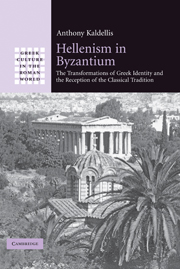 Hellenism in Byzantium
Hellenism in Byzantium Book contents
- Frontmatter
- Contents
- Preface
- Introduction
- PART I GREEKS, ROMANS, AND CHRISTIANS IN LATE ANTIQUITY
- PART II HELLENIC REVIVALS IN BYZANTIUM
- 4 Michael Psellos and the instauration of philosophy
- 5 The Third Sophistic: the performance of Hellenism under the Komnenoi
- 6 Imperial failure and the emergence of national Hellenism
- General conclusions
- Bibliography
- Index
6 - Imperial failure and the emergence of national Hellenism
Published online by Cambridge University Press: 24 December 2009
- Frontmatter
- Contents
- Preface
- Introduction
- PART I GREEKS, ROMANS, AND CHRISTIANS IN LATE ANTIQUITY
- PART II HELLENIC REVIVALS IN BYZANTIUM
- 4 Michael Psellos and the instauration of philosophy
- 5 The Third Sophistic: the performance of Hellenism under the Komnenoi
- 6 Imperial failure and the emergence of national Hellenism
- General conclusions
- Bibliography
- Index
Summary
MICHAEL CHONIATES AND THE “BLESSED” GREEKS
Rome, Greece, Scripture, and the history of the Church provided the Byzantines with a diverse source of ideals and potential identities awaiting (re)activation at the right moment, to be excerpted, recombined, and infused with new meaning. In times of crisis, Byzantine writers could turn to aspects of that past for comfort, answers, or models for the future. Some looked to the Bible or the Fathers, others to Greece or Rome. The history of these choices reflects both personal decisions and broad cultural changes that are otherwise difficult to identify in Byzantium, given the relative stability of its representational modes. In the eleventh century, for example, the historian Michael Attaleiates, who had spent his life in law and administration, turned to the pagan Romans of the Republic for explanations and solutions to the empire's decline. Attaleiates had to admit that the pagans had triumphed in their wars despite the fact that they knew nothing of God's word and did not practice Christian virtues. Attaleiates lost his faith in the link between empire and Orthodoxy, and marveled at the magnificence of the ancient Romans. Why could his own countrymen not emulate their virtue?
Attaleiates' Romanocentric response to imperial decline in the eleventh century forms a nice contrast to the Hellenocentric responses to the crisis that terminated the age of the Komnenoi. Soon after the death of Manuel, Byzantium entered another spiral of decline and dissolution.
- Type
- Chapter
- Information
- Hellenism in ByzantiumThe Transformations of Greek Identity and the Reception of the Classical Tradition, pp. 317 - 388Publisher: Cambridge University PressPrint publication year: 2008


